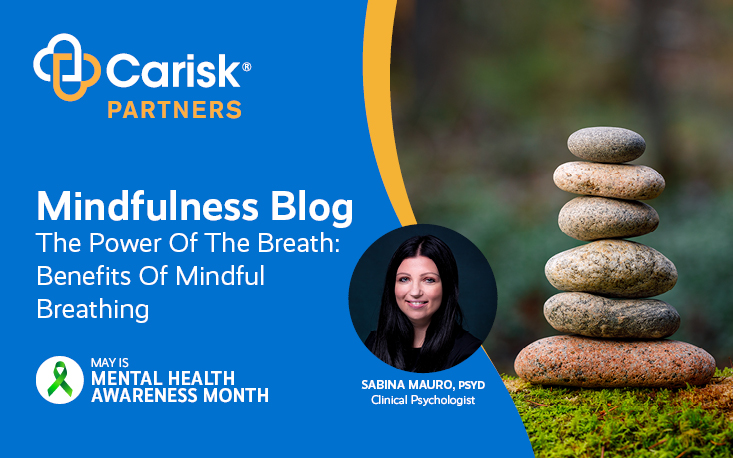Mental Health Awareness Month | Week 2 Blog by Dr. Sabina Mauro
We all have times when our attention is consumed by everything else but the present moment. In this fast paced world, we can forget to shift attention to ourselves. Our breath is the anchor to the present moment. Where is your breath right now? Lets all take a moment right now to take a deep breath it and let it out, let all the stressful buildup through the day leave with our breath. (Feel free to repeat). Learning to bring attention to your breath with an intention is mindful breathing.
Everyone has the capacity for mindfulness. Mindfulness can be described as being present in the moment without judgment; applying our attention to our bodily sensations, emotions, thoughts, and surrounding environment; and redirecting our attention to the present when it wanders.
Practicing mindful breathing not only strengthens our mind-body connection, but also has the following benefits:
- Reduce stress: Mindful breathing can help us de-activate the sympathetic nervous system (fight-or-flight response) and re-activate the parasympathetic nervous system, which is the body’s relaxation state (homeostasis).
- Strengthen body awareness: Mindful breathing can help us connect with our body by feeling rather than avoiding our body at all times.
- Diminish pain. Mindful breathing can help create a harmonious relationship with pain, attenuate pain, and improve pain symptomatology.
- Train ourselves to become an observer. Mindful breathing teaches us how to become the observer, instead of the criticizer, of our thoughts, emotions, and reactions, which can foster flexibility, change how we respond, and grant a new perspective on life.
- Increase self-compassion. Mindfulness practice can foster kindness, love, and gratitude toward ourselves and others.
- Regain sense of control. Mindfulness breathing helps regain control of mind-body connection by choosing how you want to respond to your thoughts, feelings, bodily sensations, and stressors. We train ourselves to maintain focus on our breath and build new neuropathways in the brain.
- Improve psychological well-being. Frequent mindfulness practice can improve our mood, sleep habits, attention, concentration, resilience, reduce anxiety and depression, and decrease Posttraumatic Stress Disorder (PTSD) symptomology.
- Improve physical well-being. Those that practice mindfulness notice positive changes with their physical well-being. Some of these positive changes can include improved immune function, improved cardiovascular functioning, and less frequent headaches.
Stay tuned for an introduction to mindful breathing exercises!
For the week, continue to notice your breathing. If you set a reminder this time check in with yourself and see how you feel with the above noted benefits.





